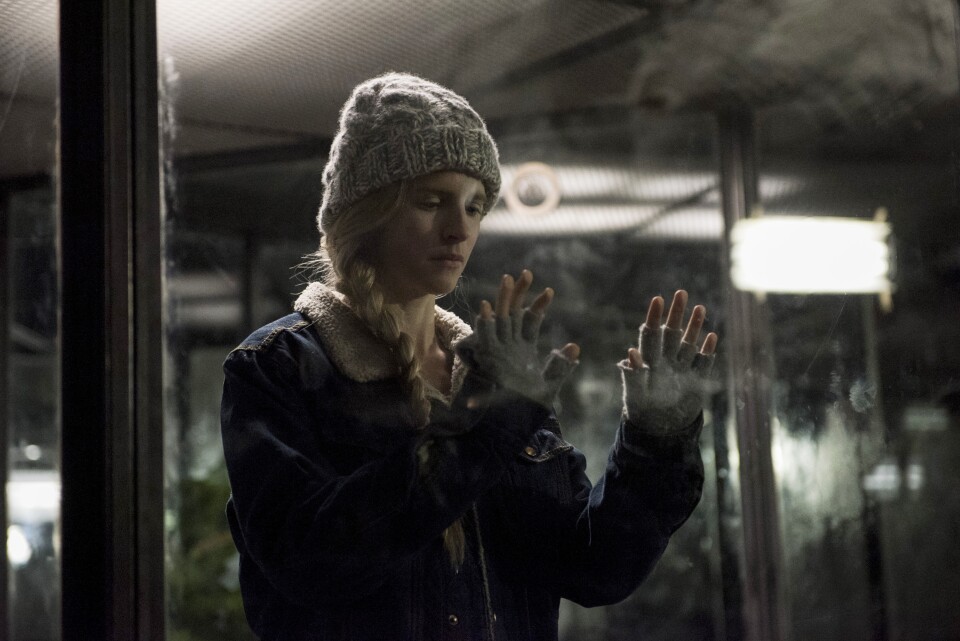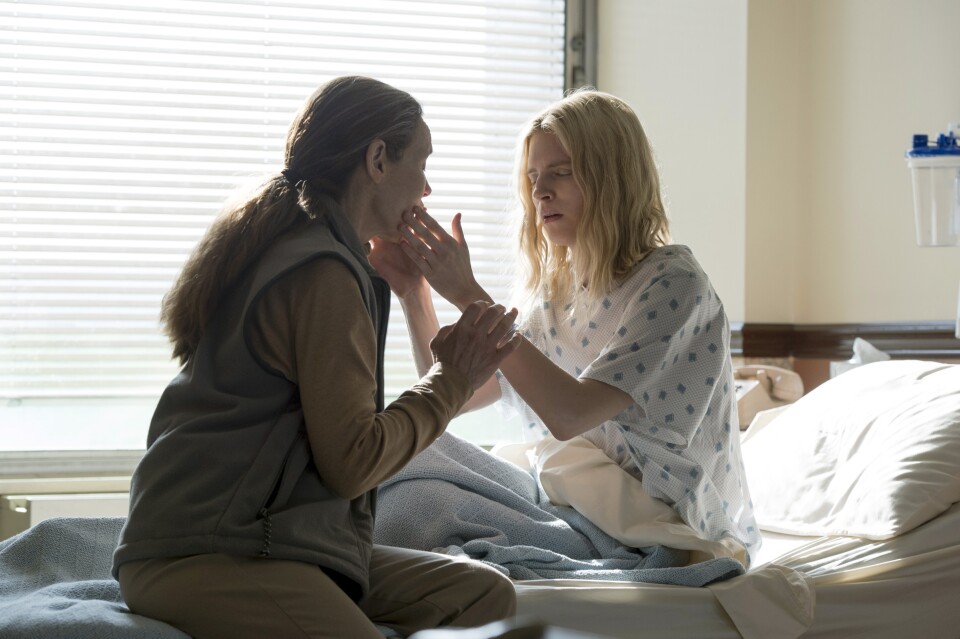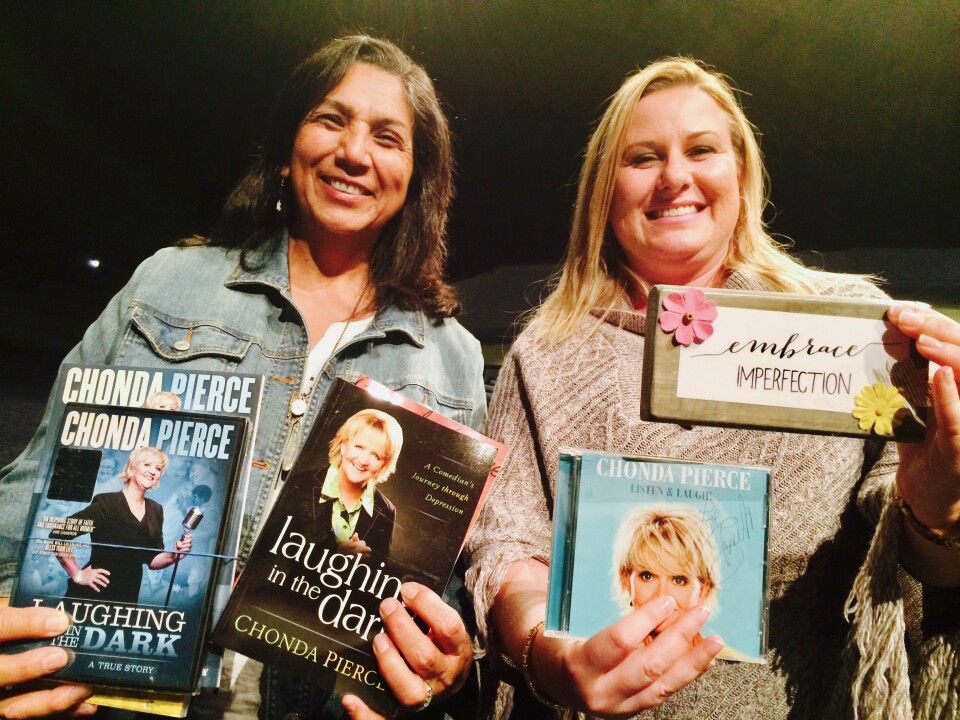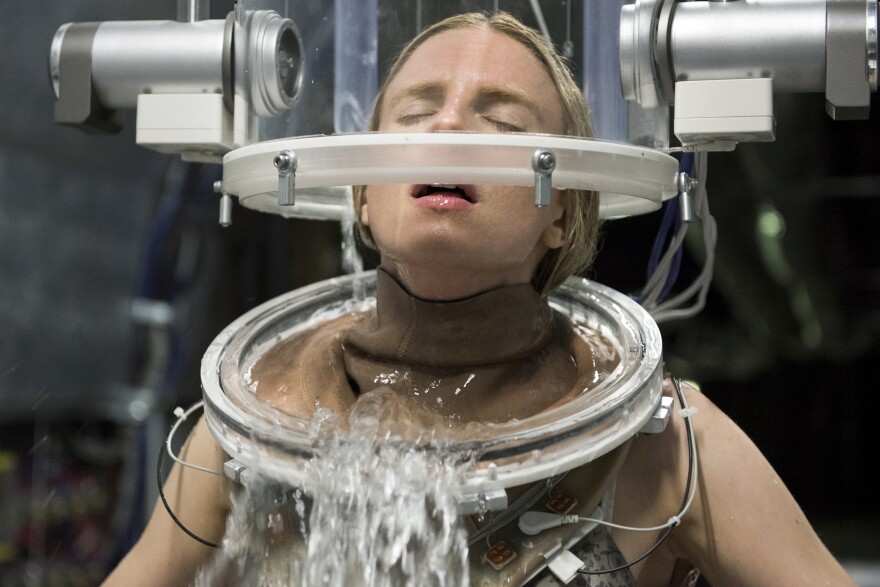Actress Brit Marling and director Zal Batmanglij talk about their mysterious new Netflix series, "The OA"; comedian Chonda Pierce has built a huge career outside the show biz mainstream; Hollywood and the gun industry have a mutually beneficial relationship.
How the creators of 'The OA' made a 'long format mind-bender'
There's a new Netflix series that may end up being your binge show of choice this holiday season — not that it’s particularly cheery.
It’s called “The OA” and all eight episodes just went up on Netflix. The streaming service had kept mum about the show until it dropped a trailer earlier this week. In the preview, a young blind woman who'd gone missing returns to her family with her eyesight intact.
"The OA" was created by Brit Marling and Zal Batmanglij. They’d previously co-written the indie films “Sound of my Voice” and “The East,” in which Marling starred and Batmanglij directed. For "The OA," he is again in the director’s chair and she plays the lead — the mysterious character called Prairie. The two recently came into The Frame studios to talk with John Horn.
NOTE: There are no spoilers in this conversation.
To hear the conversation click the play button at the top of this page.
Interview Highlights:
On how they retain the mystery:
BRIT MARLING: I guess the biggest complication in designing a mystery is that in order for it to retain its effect, it has to stay mysterious. We're so used to marketing and things upfront guiding an audience in and positioning a story for what it is. The delicious part of this is that it slipstreams through genres and does unusual things with form. The less you know about it going in, I think, the better.
On trusting the cast and crew to be discreet:
ZAL BATMANGLIJ: Nobody knew who we were or what the show was about, so no one really cared. One of the great things we did with this is we wrote all eight scripts before we started shooting. So every person in the crew, whether the camera operator or one of the producers, had read all eight scripts. And so we all felt very invested in the story that we were telling. And I think they felt ownership over the story. Everyone felt this desire to keep it secret. Also, it's a very had story to distill. I know Rod, our camera operator — he was trying to explain to his girlfriend the show he was working on. He was like, I give up. I can't explain it.

On pitching the complicated story to Hollywood:
BM: We'd spent a good three years just daydreaming in this world and creating these characters, and we wrote the first chapter. Then when it came time to attempt to make a [show] bible, it was very different to make a document that distilled the show down to its essences. Zal and I would just perform it like a play. When we went to pitch to people, we would play all of the characters and we'd act out the highlight moments through many hours. For some reason, in that format it retained its essence.
On writing the story more like a novel than a movie:
ZB: We'd written the first hour and, unlike a traditional long format story, we didn't feel the need to put all of our main characters in that first hour. That's a big difference. Usually you have to have this nuclear story engine in the first hour of a long format story, and all of your main characters, because it's a proof of concept. We thought, Why don't we have a main character appear in chapter three? Why don't we have the story reveal itself like it would in a good novel? So we approached a more novelistic style, and I think when we pitched it, we had written the first hour and it was intriguing. People were like, Does this really go somewhere? Then we start acting it out and it does go somewhere and people get into it.

On why death experiences are part of "The OA":
BM: From pretty early on, we encountered somebody, a young woman who had a near-death experience. When she described that to me, I was really riveted by the idea. She described leaving her body and the sensation of being above herself. All concerns and preoccupations went away and the only thing that remained in her mind was this question: Did I tell the people I love enough how much I love them? It became that simple. Then she rocketed back into her body. When you meet this woman, she has a kind of vividness and self possession and ferocity that's uncanny. It seems like she's really in control of her life. I was thinking it would be interesting to explore near-death experiences more and talk about somebody who's been to this other space and has returned.
On the slow-moving nature of the show:
ZB: I think we were very inspired by [writer] David Foster Wallace, who said you have to get the audience to work for something. I feel that a lot — that sometimes I don't want to watch a series that is making me surrender to it, or is going to change the rules of engagement. Then other people watch it and have an experience. I guess if people do have an experience with this, then they'll maybe convince their friends to stick with it. I don't know.
BM: I also think that we're in a time when the average audience member's story IQ is so high. It's insane. We're consuming so much content and so many stories that the audience can see the middle climax before it's coming. They know the failure. They're anticipating a lot. I think as storytellers, it's really your job to invent and to mix genres and subvert what you think is going to happen. As an audience member myself, I always feel most thrilled when the narrative goes off the rails of what I've seen before.
ZB: I think that matches the mood we feel as a country. The idea that we're going completely off book. How do we start telling stories that do that too? We certainly have the infrastructure. Because of Netflix and because we can make an eight-hour story that's available to you like a novel, you can start playing with it — what's expected, how it's going to unfold. This is something different and new and I think that's exciting.
To get more of this content, subscribe to The Frame podcast on iTunes.
Comedian Chonda Pierce, aka 'The Queen of Clean,' forged her own path to success
Who’s the most popular female stand-up comedian in America? Amy Schumer and Sarah Silverman probably come to mind. But Chonda Pierce also belongs on that list.
The Kentucky native performs her signature brand of Christian-inspired humor to sold out houses across the country, including a recent Southern California stop in Pomona as part of a 50-city tour.
Pierce's mostly female fan base is attracted to her wholesome, cheerful, "family values" comic style. But make no mistake, this "Queen of Clean" — as fans call her — is hardly scared to get a little risqué. She talks very openly about sex, the human body and embarrassing foibles in her routine.
The religious-leaning crowds love it.
"There's a lot of comedians who don't have a moral compass," said Pierce in a pre-show interview on her tour bus. "As for me, my moral compass and my faith and what I do all blends together. I can't take my hat off — Today I'm mom, today I'm a comic. My faith transcends everything that I do and everything that I am. I still step on people's toes and I still get in trouble, but at least I get paid to! (Laughs) God is good!"

As a kid, Pierce jumped into performance by mimicking the Grand Ole Opry legend Minnie Pearl. It was Pearl who taught Pierce that a person who speaks with a country twang is just as lovable as anyone else. That might sound obvious, but it was an important lesson to learn, says Pierce.
She had a tough time as a kid, growing up in the South as the daughter of an ultra-conservative preacher. Her dad was a man-of-the-cloth who suffered in silence from bipolar disorder and turned to drinking and abusive behaviors.
As blessed as Pierce says she is career-wise, mental health issues, family troubles and addiction are still very much a painful, ongoing part of her adult life. Pierce unashamedly tells people the full truth about herself — in books, on-stage and even in a recent tell-all documentary film. She maintains that keeping away any stigma that surrounds mental health is ultimately healing and healthy.
"I'm just coming out of two years of the darkest, deepest grief," Pierce said. "And a [documentary] that revealed so much about me, I couldn't believe it. And I didn't ruin my own career yet. That's the biggest surprise!" (Laughs)

Pierce herself struggles with clinical depression. Her sisters, mother and husband have all passed away. Her daughter often excludes her from family gatherings with her grandchildren. Given a little thought, it appears there's not much for Pierce to laugh about. Or is there?
"I have outed myself in every way possible for my failures," Pierce said cheerfully.
"But I have revealed all there is to [know] about me. There's a great peace that comes with that. And love that I have for myself. And then you can love others more."
That honesty peppered with laughter and transparency is what draws scores of people to Pierce. To reach as many fans as possible, she plays a wide assortment of venues — from church halls to concert halls. In January, she'll even perform at a Presidential inaugural ball in
Washington.
On a recent night in Southern California, Chonda's fans came out en masse to Purpose Church in Pomona. Melody Aardema sat right up close to the stage with a friend. The pair had lugged along a small stack of books, DVDs, and CDs for Pierce to sign after the show.
"I just found healing in her words," Aardema said.
For some 20 years, Aardema's family has endured tough times with her son's bipolar disorder — a condition that almost ripped the family apart. But she said Chonda's words keep her going.
"I think the darkest moment was when our son decided to separate from us and we hadn't heard from him in years," Aardema said. "That's not how it's supposed to be. So when it happens you're [in a] rough patch. You are feeling alone. And like [Pierce] said, you are taught not to air your laundry. And then you realize God is there and other people are going through things. And I think Chonda helped me realize this was never God's plan."
"We have learned how to stuff and hide who we are so well," Pierce said. "No wonder the world is in such upheaval and political tension and racial tension.
"At this point in my career, I've placed a mirror in front of the Christian market for so long, I get to tell us to lighten up. We aren't [presenting] a good picture of who we are out there in society. I get by with saying 10 times more than any priest or rabbi out there!" (Laughs)

Pierce's comedy act is part prayer service, part Oprah show and part concert — with a girls-night-out-slumber-party vibe.
For Pierce, the goal is clear: to remind people that even in the darkest of places, there's always room for light and laughter.
"I think when my shows sell out, this is just a sad time in our world and we all need a laugh!"
Click on the media player above to hear the full interview.
Hollywood's complicated relationship with the gun industry
Does Hollywood love guns?
Gun violence in film is going up even as the stars toting them around call for gun control in real life. The Hollywood Reporter published a story titled "Locked and loaded: the gun industry’s lucrative relationship with Hollywood.” It's about the uneasy but mutually-beneficial relationship between guns and Hollywood.
Gary Baum, senior writer at the Hollywood Reporter, co-authored the story with Scott Johnson. During his investigation, Baum visited the National Rifle Association Museum in Fairfax, Virgina. There, he found a whole array of guns used on movie sets, including those wielded by Clint Eastwood in "Dirty Harry" and the Beretta 92F used by Bruce Willis in "Die Hard."
There's a complicated relationship between the NRA and Hollywood actors — especially those who espouse liberal political ideals. Matt Damon, a gun control advocate, is famous for shooting his enemies in the Jason Bourne franchise. Guest host Josie Huang checks in with Gary Baum on what rampant gun use and on-screen violence says about the film industry and our society.
Click on the media player above to hear the full interview.




